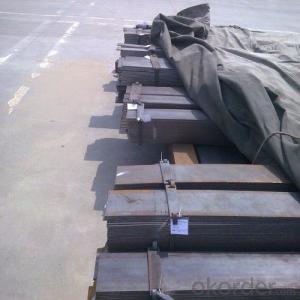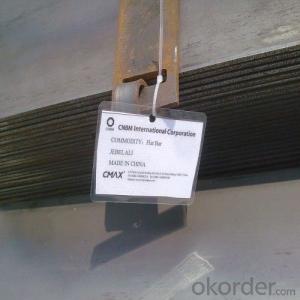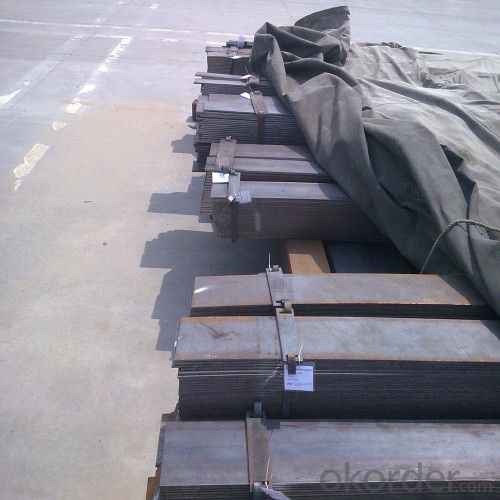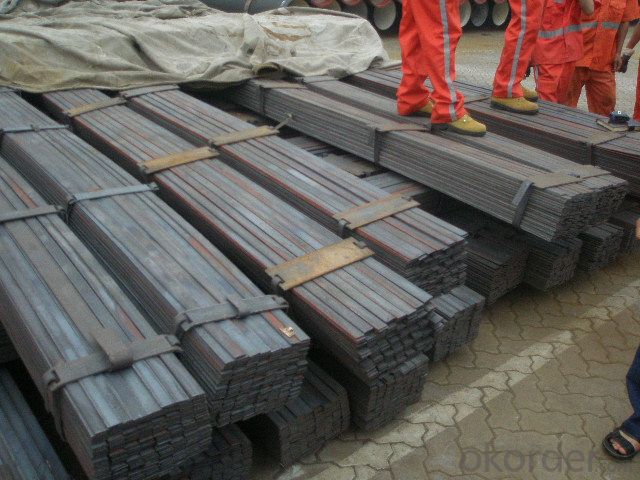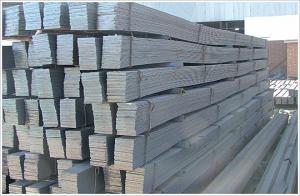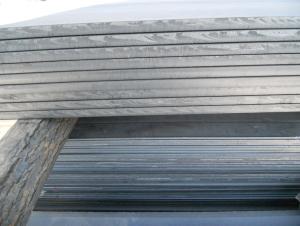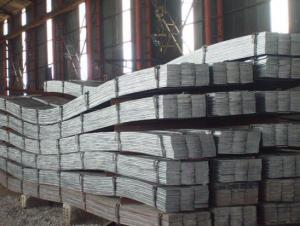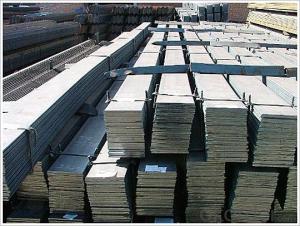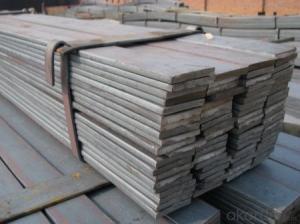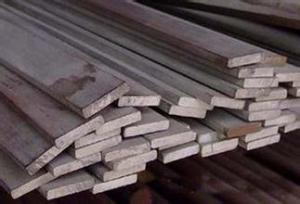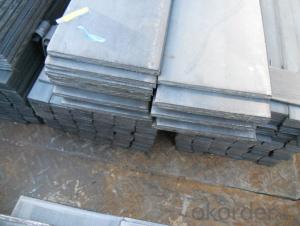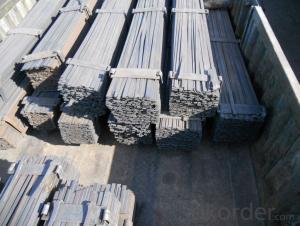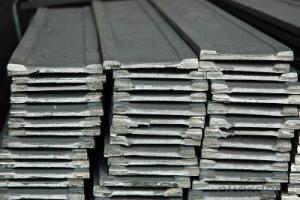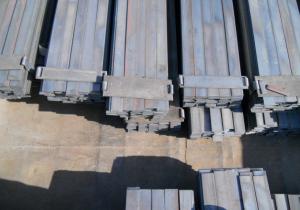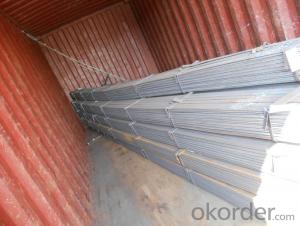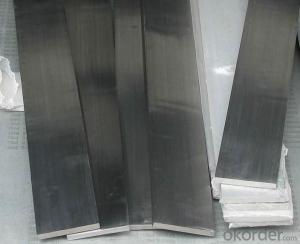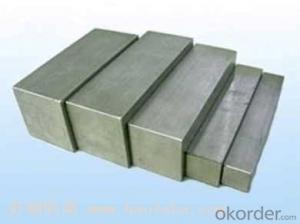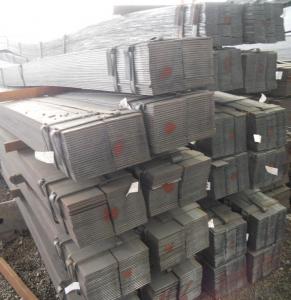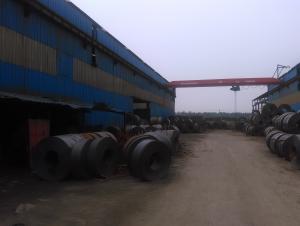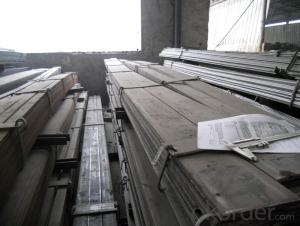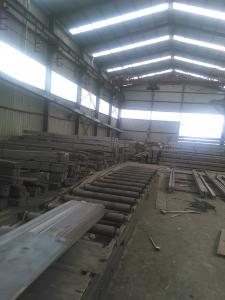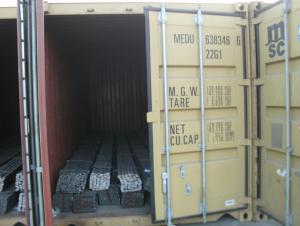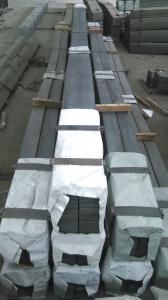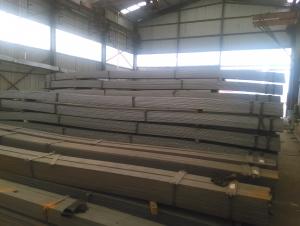Steels Flat Bar with Material Grade Q235
- Loading Port:
- Tianjin
- Payment Terms:
- TT OR LC
- Min Order Qty:
- 25 m.t.
- Supply Capability:
- 10000 m.t./month
OKorder Service Pledge
OKorder Financial Service
You Might Also Like
OKorder is offering high quality Flat Bar at great prices with worldwide shipping. Our supplier is a world-class manufacturer of steel, with our products utilized the world over. OKorder annually supplies products to European, North American and Asian markets. We provide quotations within 24 hours of receiving an inquiry and guarantee competitive prices.
Product Applications:
Slit Cutting Flat Bars are ideal for structural applications and are widely used in the construction of buildings and bridges, and the manufacturing, petrochemical, and transportation industries.
Product Advantages:
OKorder's Flats Bars are durable, strong, and resist corrosion.
Main Product Features:
· Premium quality
· Prompt delivery & seaworthy packing (30 days after receiving deposit)
· Corrosion resistance
· Can be recycled and reused
· Mill test certification
· Professional Service
· Competitive pricing
Product Specifications:
Manufacture: Hot Rolled
Grade: Q195 – 235
Certificates: ISO, SGS, BV, CIQ
Length: 6m – 12m, as per customer request
Packaging: Export packing, nude packing, bundled
Chemical composition of Q235
Alloy No | Grade | Element(%) | ||||
C
| Mn
| S
| P
| Si
| ||
Q235
|
B
|
0.12—0.20 |
0.3—0.7 |
≤0.045 |
≤0.045
|
≤0.3
|
Physical properties of Q235
Alloy No | Grade | Yielding strength point(Mpa) | Tensile strength (Mpa) | Elongation after fracture(%) | ||||||
Thickness (mm) | Thickness (mm) | |||||||||
≤16 | >16--40 | >40--60 | >60--100 | ≤16 | >16--40 | >40--60 | >60--100 | |||
≥ | ≥ | |||||||||
Q235 |
B |
235 |
225 |
215 |
205 |
375--500 |
26 |
25 |
24 |
23 |
FAQ:
Q1: How soon can we receive the product after purchase?
A1: Within three days of placing an order, we will begin production. The specific shipping date is dependent upon international and government factors, but is typically 7 to 10 workdays.
Q2: How do we guarantee the quality of our products?
A2: We have established an advanced quality management system which conducts strict quality tests at every step, from raw materials to the final product. At the same time, we provide extensive follow-up service assurances as required.
Q3: The products are invoicing on theoritical weight or on actual weight?
A3: We can do it in both manners, according to the customers' request.
Images:
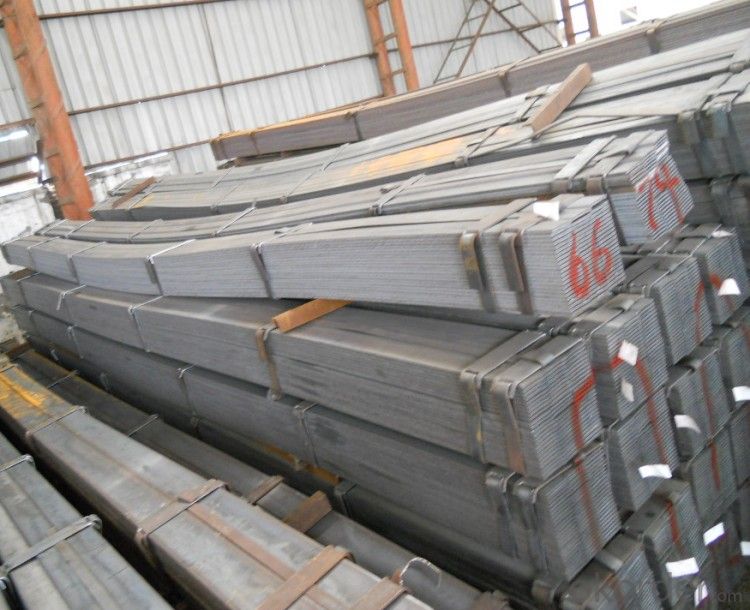
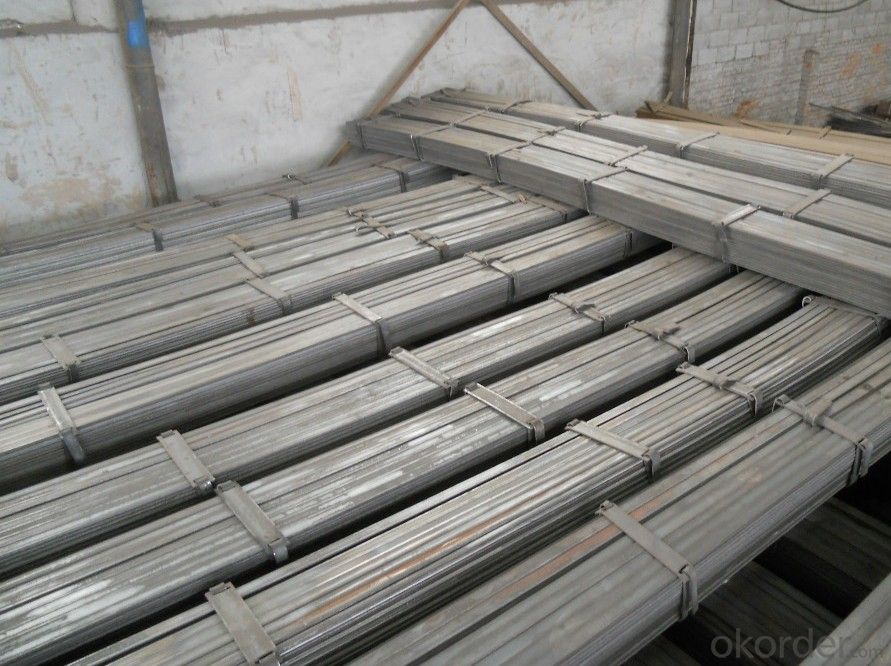
- Q: How strong are steel flat bars?
- Steel flat bars are known for their strength and durability. The strength of steel flat bars can vary depending on the grade and composition of the steel used. Steel flat bars are commonly made from mild steel, which has a relatively low carbon content, making it more ductile and easier to work with. Mild steel flat bars have a moderate strength and are suitable for various applications such as construction, manufacturing, and fabrication. On the other hand, high-strength steel flat bars, such as those made from alloy steels or heat-treated steels, have significantly higher strength properties. These types of steel flat bars are specifically designed to withstand heavy loads, resist deformation, and provide structural support in demanding applications. They are commonly used in industries such as construction, automotive, and aerospace. Overall, steel flat bars are generally considered to be strong and capable of withstanding substantial amounts of force and weight. However, it is important to choose the appropriate grade and size of steel flat bar for the intended application to ensure optimal strength and performance. Consulting with a structural engineer or steel supplier can help determine the most suitable type of steel flat bar for a particular project.
- Q: What are the applications of steel flat bars in construction?
- Steel flat bars have a multitude of applications in the construction industry due to their versatility and durability. These bars are widely used in various construction projects for structural support, reinforcement, and framing purposes. One of the key applications of steel flat bars in construction is their use as supports or beams. They can be used to provide additional strength and stability to structures, such as bridges, buildings, and platforms. Steel flat bars are also utilized as lintels above windows and doors, offering structural support and preventing sagging or cracking. Another common application of steel flat bars is in reinforcing concrete structures. These bars are embedded within concrete to provide tensile strength and prevent cracking under heavy loads or vibrations. They are commonly used in the construction of foundations, columns, slabs, and walls. Steel flat bars are also used for framing purposes in construction projects. They can be used as framing members for walls, ceilings, and roofs, providing a strong and rigid framework. Additionally, they can be used as braces to reinforce structures against lateral forces, such as wind or earthquakes. In addition to their structural applications, steel flat bars are also used for decorative purposes in construction. They can be used as architectural accents, handrails, or ornamental fixtures, adding aesthetic appeal to buildings and structures. Overall, the applications of steel flat bars in construction are extensive. Their strength, durability, and versatility make them an essential component in various construction projects, ensuring the stability, safety, and longevity of structures.
- Q: Can steel flat bars be used in the manufacturing industry?
- Steel flat bars are widely used in the manufacturing industry for their versatility, strength, and durability. They find extensive applications in the production of machinery, tools, construction materials, and automotive components. These bars serve as structural supports, frames, or reinforcements in manufacturing processes. Moreover, they can be easily welded, drilled, and shaped, making them suitable for various fabrication techniques. The exceptional mechanical properties and capacity to meet diverse application requirements make steel flat bars a favored option in the manufacturing industry.
- Q: Can steel flat bars be used for creating handrails or guardrails?
- Yes, steel flat bars can be used for creating handrails or guardrails. Steel flat bars are commonly used in construction and fabrication due to their strength and durability. They can be easily shaped and welded to create custom handrails or guardrails that provide stability and safety in various settings such as staircases, balconies, or walkways.
- Q: What are the different types of surface defects in brass steel flat bars?
- There are several types of surface defects that can occur in brass steel flat bars, including scratches, pits, dents, and surface roughness.
- Q: Are steel flat bars resistant to impact or shock?
- Yes, steel flat bars are generally resistant to impact or shock due to their high tensile strength and durability. They are commonly used in applications where resistance to impact or shock is required, such as construction, manufacturing, and structural projects.
- Q: Are steel flat bars suitable for the construction of retail spaces or shopping centers?
- Certainly! Steel flat bars are a suitable option when constructing retail spaces or shopping centers. Their strength, durability, and versatility make them widely used in the construction industry. Framing, support beams, and decorative elements are just a few of the many purposes they can serve. Structurally, steel flat bars provide excellent support and can handle heavy loads, which makes them perfect for large commercial spaces like shopping centers. They are also resistant to fire, corrosion, and pests, ensuring a long lifespan and minimal maintenance. Moreover, steel flat bars can be easily customized and fabricated to meet specific design requirements. They can be cut, welded, and shaped into different forms, giving flexibility to architectural designs. In addition, steel is a sustainable and environmentally-friendly material as it can be recycled and reused. This aspect makes it an appealing choice for retail spaces or shopping centers that wish to embrace green building practices and reduce their environmental impact. All in all, steel flat bars offer a range of benefits in terms of strength, durability, versatility, and sustainability, making them a suitable and advantageous choice for constructing retail spaces or shopping centers.
- Q: What are the benefits of using steel flat bars in architectural projects?
- There are several benefits to using steel flat bars in architectural projects. Firstly, steel flat bars are known for their strength and durability. Steel is a robust material that can withstand heavy loads and extreme weather conditions, making it ideal for structural applications in buildings. This strength allows architects to design structures with larger spans and open spaces, providing more flexibility in their designs. Secondly, steel flat bars offer excellent corrosion resistance. Steel is often coated with protective layers such as galvanization or powder coating, which further enhances its ability to resist rust and corrosion. This is particularly important in architectural projects, where the structures are constantly exposed to the elements. The corrosion resistance of steel flat bars ensures the longevity and maintenance-free nature of the architectural project. Another advantage of using steel flat bars is their versatility in design. Steel can be easily manipulated and fabricated into various shapes and sizes, allowing architects to create unique and intricate designs. Steel flat bars can be cut, bent, and welded to fit specific project requirements, providing endless possibilities for creativity in architectural projects. Additionally, steel flat bars offer cost-effectiveness. Steel is a readily available material and its production processes have been streamlined over the years, making it a cost-effective option for architectural projects. The durability and maintenance-free nature of steel also contribute to long-term cost savings, as the structures will require minimal repairs and replacements over their lifespan. Lastly, steel flat bars are environmentally friendly. Steel is a highly recyclable material, and using steel flat bars in architectural projects reduces the need for new raw materials. Recycling steel reduces energy consumption and greenhouse gas emissions, making it a sustainable choice for architects and developers. In conclusion, the benefits of using steel flat bars in architectural projects include their strength, durability, corrosion resistance, versatility in design, cost-effectiveness, and environmental friendliness. Incorporating steel flat bars in architectural designs not only provides structural integrity but also allows for unique and creative designs that will stand the test of time.
- Q: Are steel flat bars available in customized lengths?
- Yes, steel flat bars are available in customized lengths. Steel suppliers and manufacturers typically offer a range of standard lengths for flat bars, but they also have the capability to cut and customize the bars to specific lengths as per customer requirements. This flexibility allows customers to order steel flat bars in the exact lengths they need for their specific projects or applications, ensuring a perfect fit and minimizing waste. Whether it's a small DIY project or a large-scale construction project, customers can typically work with steel suppliers to obtain customized lengths of steel flat bars to suit their needs.
- Q: Can steel flat bars be used for making brackets or supports for automotive accessories?
- Yes, steel flat bars can be used for making brackets or supports for automotive accessories. Steel is a strong and durable material that provides excellent structural support, making it suitable for various applications in the automotive industry.
Send your message to us
Steels Flat Bar with Material Grade Q235
- Loading Port:
- Tianjin
- Payment Terms:
- TT OR LC
- Min Order Qty:
- 25 m.t.
- Supply Capability:
- 10000 m.t./month
OKorder Service Pledge
OKorder Financial Service
Similar products
Hot products
Hot Searches
Related keywords
